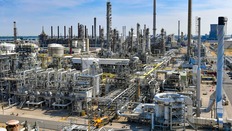- Shell Moerdijk will invest billions over the next decade, subject to investment decisions.
- A new pyrolysis oil upgrader unit with a capacity of 50,000 tonnes per annum will start production in 2024.
- Shell aims to achieve net zero emissions by 2032 using hydrogen and CCS.
- Shell plans to double the number of plants at Moerdijk within ten years.

Investment and Transition
Shell Chemicals Park Moerdijk announced a significant investment to transition the site to meet evolving customer demands for low-carbon and recycled products. The investment includes building a new pyrolysis oil upgrader unit to convert hard-to-recycle plastic waste into chemical feedstock. This marks a major step towards using more circular and bio-based feedstocks, offering low-carbon products, and achieving net-zero emissions within ten years through hydrogen and carbon capture and storage (CCS).
Pyrolysis Oil Upgrader
The new pyrolysis oil upgrader unit, expected to start production in 2024, will have a capacity of 50,000 tonnes per annum. This unit will treat liquid made from plastic waste that cannot be mechanically recycled, preventing it from being incinerated. The treated pyrolysis oil will be used to produce circular chemicals, addressing growing customer demand and supporting Shell’s ambition to recycle one million tonnes of plastic waste by 2025.
Hydrogen and Bio-based Feedstocks
Shell Chemicals Park Moerdijk is developing plans to produce hydrogen from residual gases from the park’s production process. The hydrogen will be used to heat industrial furnaces, with the CO2 byproduct captured and stored in old gas fields under the seabed. Additionally, bio-based feedstocks will be utilized, with a biofuels facility at Shell Energy and Chemicals Park Rotterdam expected to start production in 2024.
Expansion Plans
Shell aims to double the number of plants at Shell Chemicals Park Moerdijk over the next decade, subject to investment decisions. This expansion will support the introduction of new products with a lower carbon footprint, meeting the increasing demand for sustainable chemicals.

